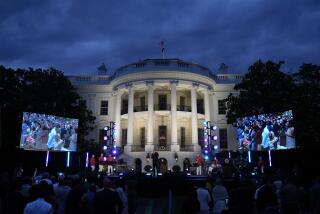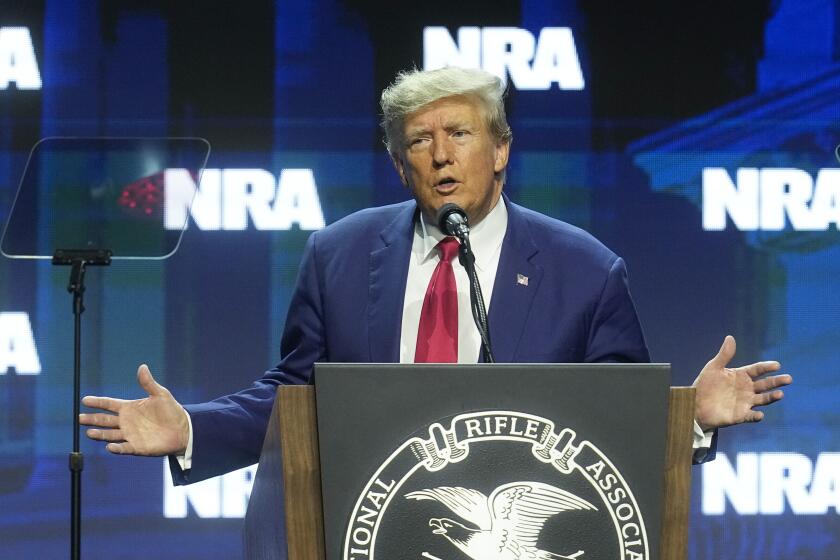Op-Ed: I’m a black daughter of the Confederacy, and this is how we should deal with all those General Lees
As monuments to the Confederacy are swept away from public spaces, white supremacists, neo-Nazis and the president of the United States have been fretting over the so-called attack on history, presumably their history. Their white history.
Attack, assault, erasure, destruction — well, truth and justice in the face of denial and dissembling can certainly feel like that. But there is no such thing as whites-only history, there never was, not even with regard to the Confederacy.
Like millions of African Americans, I am the descendant of a Confederate soldier. True, we are most likely descendants through coerced sex and rape, but we are descendants all the same. According to Ancestry.com, the DNA of the average African American is 29% European. These bronzed southern soldiers are literally our forefathers too.
In the peculiar, perverted institution of slavery, white men sired, enslaved and often sold their own children; black nieces and white nephews played together before adulthood drove them to disparate destinies. Whites owned their black siblings. Thomas Jefferson was 45 when he fathered the first of six children on the 15-year-old Sally Hemmings, who was his wife’s half sister and also her property. My great-great-grandmother Mary Ellen Fulton was her mistress’s niece.
The monuments debate isn’t about the past. It’s about present-day white supremacy and whether our nation is going to stop making excuses and stare it down.
None of this is new or secret information. But the Southern states established powerful “don’t ask, don’t tell” rules that were essential to both their social structure and the economics of slavery. With power on one side and humiliation on the other, our mythical, segregated history took shape.
Of course, most white Southerners of the period were neither villains nor heroes. The majority did not enslave other people, but neither did they advocate the end of slavery or even the softening of slavery. They did not work to halt the worst practices of the era — the sale of children away from parents, the separation of husbands and wives — nor did they seek to end the concubinage of enslaved girls and women. Many did not own slaves simply because they couldn’t afford them.
Blacks and whites will have different perspectives on their entwined history. War victory for my white great-great-great grandfather, Jeremiah H. Dial, who enlisted in the 31st Arkansas infantry regiment and was wounded in the battle of Stone River, Tenn., in December 1862, would have meant defeat for my great-great-great-grandmother Lavinia Fulton and their daughter, Mary Ellen. Instead, Lavinia died a free woman, living to play with her grandchildren and give thanks to God every Sunday in church in Birmingham, Ala. I thank God my great-great-great-grandfather lost. Every right-thinking person should be glad he lost.
Yet the monuments debate isn’t really about the past. It’s about a present-day assertion of white supremacy and whether our nation is going to stop making excuses and stare it down. Most of the statues, as has been widely discussed, were erected long after Robert E. Lee surrendered at Appomattox. They were hoisted into view to assert white dominance at specific points in time when African Americans gained a measure of political influence — during Reconstruction and the civil rights era. With the bronzes came domestic terrorism, lynchings, bombings and cross burnings. The current uptick in neo-Nazi and white supremacist activity was entirely predictable. With clockwork precision it surged at the time of the nation’s first African American president.
So why do some people treat modern icons as if they were ancient relics, like marbles from the Parthenon?
Fear. History isn’t being erased, but it is being corrected. Relocating a Confederate statue to, say, a museum, is an acknowledgment that we see the naked emperor; we see through the contorted logic that it is possible to separate the Confederacy from the institution of slavery, that it’s a whites-only story and slavery is blacks-only, and that treason is the same as patriotism.
The president has asked, “Where will it end?” Will the removal of General Lees lead to upheaval for Thomas Jefferson? Trigger the end for George Washington?
I would ask, How could a patriot be confused with a traitor? How can leading a war to bring forth a new country be confused with leading a rebellion to tear it in two?
The two kinds of monuments do, however, have something in common. The memorialized men serve as avatars, as conduits for the values they espoused. Revolutionary-era monuments lead us to contemplate and revere Revolutionary-era values. Confederate monuments do the same for Confederate ideals. The men of both ages were flawed, but the values of one age bind and sustain us as a nation. The values of the other do not.
As for my Confederate ancestor, I consider him without bitterness. He was a man of his time, his family, his community and his culture. He probably wasn’t particularly evil — just an ordinary man, without the advantage we have: 152 years’ perspective on the Civil War. I have met a few of his white descendants — my cousins — and we regard each other with genuine affection.
To those who would keep Jeremiah Dial frozen in time, forever trapped at the moment he chose a cause on the wrong side of humanity, I believe you do him a disservice. To those who use him as an excuse to fly the flag of modern-day anti-Semitism, racism and bigotry, you have no right.
To all the bronze Confederate soldiers, in whom I see the image of my great-great-great-grandfather, I would extend this grace. Without resentment or rancor, I would move them into museums and there tell the story of their lives. I would end their utility as flashpoints for racism and division, and, once and for all, allow them to retire from their long service as sentries over a whitewashed history.
Lisa Richardson is a former member of the Los Angeles Times Editorial Board.
Follow the Opinion section on Twitter @latimesopinionand Facebook
MORE FROM OPINION
Republicans are asking a horrific question: Is our president insane?
Violent demonstrators in Berkeley are thugs, not activists
‘Sheriff Joe’ and Donald Trump are emblems of racism and lawlessness
Trump is shedding supporters like no other president in modern history
More to Read
A cure for the common opinion
Get thought-provoking perspectives with our weekly newsletter.
You may occasionally receive promotional content from the Los Angeles Times.










